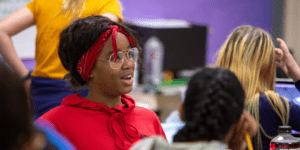 In the rapidly evolving landscape of education, the role of school leaders has moved well beyond administrative tasks. They are now key figures in fostering an inclusive and student-centered learning environment. This paradigm shift is moving towards educational equity, amplifying students’ perspectives, and giving students more space to shape the conversations that influence their education.
In the rapidly evolving landscape of education, the role of school leaders has moved well beyond administrative tasks. They are now key figures in fostering an inclusive and student-centered learning environment. This paradigm shift is moving towards educational equity, amplifying students’ perspectives, and giving students more space to shape the conversations that influence their education.
In Leading Equitable Schools (LES), school leaders actively listen to the stories of students furthest from justice in their schools and districts. Engaging in listening sessions, school leaders listen to students share their thoughts on concepts like status, agency, and belonging at school. In recent reflections completed by LES participants, many leaders expressed an increase in their urgency in relying on authentic student experiences to shift their leadership practices. One leader shared how, thanks to the learning and reflection from LES, their school vision became more focused on student agency and less on systems and structures.
One Minnesota school leader’s main takeaway from their year in LES was how students’ voices are often missing from the decision-making process. Reframing their approach, they now ask one simple question: “Whose voice is missing from the conversation?” This school leader encourages the staff to ask this question whenever they tackle a problem.
The shift toward cultivating spaces where student voices and experiences are valued allows schools and districts to draw on the experiences of those they hope to serve most. In recent reflections, school leaders expressed their continued commitment to embracing students’ voices. One leader shared:
“I want to continue to more intentionally create space for student conversations, believe what they say, and integrate it into the action steps of my work.”
As the educational landscape continues to change and move forward, school leaders must prioritize student experiences and acknowledge the invaluable insights students bring. Together, school leaders and students can co-create visions for educational experiences that empower all students, regardless of background, to build limitless futures for themselves, their families, their communities, and the world.

